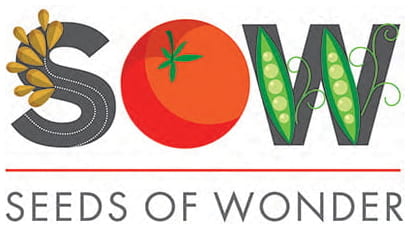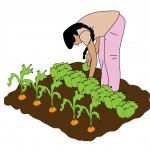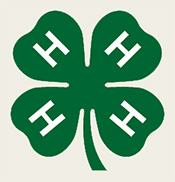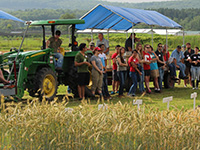Designed to be taught in multiple sessions, though specific activities can be pulled and taught on their own.
New!

Project S.O.W:
Food Gardening with Justice in Mind
The Project S.O.W. (Seeds of Wonder): Food Gardening with Justice in Mind curriculum, created for educators who work with young people ages 13-19, centers personal growth, community connection, and equity. Project S.O.W. has been created for groups of 6 to 20 participants, yet is adaptable to smaller and larger groups, and can be used in a wide variety of school, afterschool, and community settings. All youth engaged in Project S.O.W. are encouraged to have a food gardening experience. The curriculum has been designed with flexibility to support youth having diverse growing experiences- indoors or outdoors; in containers or the ground. We define a garden as any space in which you intentionally cultivate plants.
Project S.O.W. complements and integrates well with Cornell Garden-Based Learning’s Seed to Supper program, a program for adult gardeners. Seed to Supper is an accessible gardening course that gives beginner gardeners the tools they need to connect with others in community, grow in confidence, and successfully grow a portion of their food on a limited budget. Many educators in New York State requested a similar, age-appropriate, curriculum for youth, which is how this curriculum came to be.
In Project S.O.W., youth work together to investigate how to grow food, explore their relationship with the land and food system, and practice leadership in their communities.
Our Favorites:
 Gardening in Our Warming World: Youth Grow!: Features activities on the science of climate change, cause and effect, and actions we take to address the issue, but with a more empowering and less alarming tone to maximize meaningful responses and preventing climate-anxiety. Self-reflective and inspiring activities explore what people and communities are doing, what youth themselves can do now, and how they see themselves in the future making positive changes. Curriculum focuses on systems thinking, sustainability and food systems. Activities are appropriate for Beginning, Intermediate and Advanced skill levels (grades 3-6, 7-12) with some early learning introduction.
Gardening in Our Warming World: Youth Grow!: Features activities on the science of climate change, cause and effect, and actions we take to address the issue, but with a more empowering and less alarming tone to maximize meaningful responses and preventing climate-anxiety. Self-reflective and inspiring activities explore what people and communities are doing, what youth themselves can do now, and how they see themselves in the future making positive changes. Curriculum focuses on systems thinking, sustainability and food systems. Activities are appropriate for Beginning, Intermediate and Advanced skill levels (grades 3-6, 7-12) with some early learning introduction.
Dig Art! Cultivating Creativity in the Garden : Integrates gardening with the arts. Activities teach ecological literacy through visual art, music, performance, and more.
: Integrates gardening with the arts. Activities teach ecological literacy through visual art, music, performance, and more.
Discovering Our Food System: An experiential learning program about how food gets from farm to table, and how we – as eaters – are part of the process.
 Seed to Salad:Youth grow salad gardens, with emphasis on decision-making and a multidisciplinary approach, including nutrition, physical activity, math, and language arts. Seed to Salad – Spanish Version. Gardeners of all ages can visit the Vegetable Varieties for Gardeners citizen science project to share what varieties perform well – and not so well – in their gardens.
Seed to Salad:Youth grow salad gardens, with emphasis on decision-making and a multidisciplinary approach, including nutrition, physical activity, math, and language arts. Seed to Salad – Spanish Version. Gardeners of all ages can visit the Vegetable Varieties for Gardeners citizen science project to share what varieties perform well – and not so well – in their gardens.
Youth Grow : A leadership program that prepares youth to become actively involved in learning about and transforming their local food systems.
: A leadership program that prepares youth to become actively involved in learning about and transforming their local food systems.
Other Great Activities:
 Children’s Garden Consultants: Youth become experts in children’s garden design by critically comparing a variety of gardens, and exploring ways to improve them.
Children’s Garden Consultants: Youth become experts in children’s garden design by critically comparing a variety of gardens, and exploring ways to improve them.
Garden in the City (pdf): Designed for youth and adults who have had little experience with gardening and limited space. Information covers starting seeds, planning the garden, cleaning the site, breaking ground, planting, weeding, thinning, and harvesting. Lists the supplies and tools you’ll need, and suggests group activities.
 Living Sculpture: Art made with plants. Introduces simple and more involved projects, including topiary, woven branch art, sod sculpture, crop art and more.
Living Sculpture: Art made with plants. Introduces simple and more involved projects, including topiary, woven branch art, sod sculpture, crop art and more.
One Seed at a Time: Fighting Climate Change in the Garden: Focus on monitoring, alleviating, and mitigating climate change’s impacts in the garden. Activities serve as a springboard for youth community action projects that help to fight climate change.
 Radishes to Riches: A Produce Marketing Project for Youth (pdf): This workbook helps youth and adults plan what to grow and how to market their crops. It provides a hands-on experience of producing the crop and carrying out a marketing plan to sell that crop for a profit.
Radishes to Riches: A Produce Marketing Project for Youth (pdf): This workbook helps youth and adults plan what to grow and how to market their crops. It provides a hands-on experience of producing the crop and carrying out a marketing plan to sell that crop for a profit.
Sowing the Seeds of Success (pdf): This booklet details the organizational steps needed to initiate a successful community gardening project with kids. Key chapters highlight how to define roles and responsibilities, form and manage partnerships, create an identity, raise funds, and more! Sowing the Seeds of Success is now web-based! Visit our Program Tools section for the web-based version.
 Plants and Textiles: Focuses on past and present technologies that convert plants into products. Activities include making paper, ropes, indigo dye, mat weaving and knotted nets.
Plants and Textiles: Focuses on past and present technologies that convert plants into products. Activities include making paper, ropes, indigo dye, mat weaving and knotted nets.
Using Plants to Bridge the Generations: Horticultural and Intergenerational Learning as Therapy (pdf): A Cornell Cooperative Extension publication and 4-H Leaders Guide. Plan for a Horticultural Intergenerational Therapy program.
 Vegetable Fare: Displaying Vegetables at Their Best (pdf): This guide covers proper harvest and storage with emphasis on exhibiting produce at fairs. It highlights both general principles and provides specifics on more than 35 crops. Gardeners of all ages can visit the Vegetable Varieties for Gardeners citizen science project to share what varieties perform well – and not so well – in their gardens.
Vegetable Fare: Displaying Vegetables at Their Best (pdf): This guide covers proper harvest and storage with emphasis on exhibiting produce at fairs. It highlights both general principles and provides specifics on more than 35 crops. Gardeners of all ages can visit the Vegetable Varieties for Gardeners citizen science project to share what varieties perform well – and not so well – in their gardens.
Vegetable varieties investigation (Vvi): Vegetable varieties investigation (Vvi) is a unique citizen science program designed to engage youth in horticulture. Participants interview gardeners about their opinions on vegetable varieties, and submit their findings to an online database that serves as a nation-wide online library of vegetable variety data, Vegetable Varieties for Gardeners (VVfG).
Oldies but Goodies:
 The Three Sisters: Exploring an Iroquois Garden (pdf): This award-winning publication explores the food, customs and stories that evolved from the traditional companion planting of corn, beans, and squash– the Three Sisters. It includes legends, planting facts, a call for biodiversity and uses of the Three Sisters. Please also visit our Three Sisters link for the web-based project!
The Three Sisters: Exploring an Iroquois Garden (pdf): This award-winning publication explores the food, customs and stories that evolved from the traditional companion planting of corn, beans, and squash– the Three Sisters. It includes legends, planting facts, a call for biodiversity and uses of the Three Sisters. Please also visit our Three Sisters link for the web-based project!
Rice: Grain of the Ancients (pdf): Through hands-on activities and an imaginary pen-pal, children learn about rice. They’ll learn how to grow it and about its related nutrition, science, and culture. (Ages 8-12)
 The Appealing Apple (pdf): Find out the amazing history and lore of apples, while going on the apple’s incredible journey through time. Hands-on activities include making apple doll puppets, exploring apples in literature and playing historic games. Learn how apple trees grow, flower, and produce their fruit. Try out apple taste tests, making cider, and some unusual recipes using apples. (Ages 9-12)
The Appealing Apple (pdf): Find out the amazing history and lore of apples, while going on the apple’s incredible journey through time. Hands-on activities include making apple doll puppets, exploring apples in literature and playing historic games. Learn how apple trees grow, flower, and produce their fruit. Try out apple taste tests, making cider, and some unusual recipes using apples. (Ages 9-12)
The Great American Peanut (pdf): Education and entertainment are integrated with history in this publication on peanuts. It’s designed to encourage students to use their imagination while learning about peanuts and the farmers who grow them.
 The Humble Potato: Underground Gold (pdf): Come and explore the world of potatoes through the eyes of three imaginary children: one in South America in the year 1300, another in Ireland during the potato famine, and one in present-day Long Island. Through entertaining stories and hands-on activities, children will learn everything there is to know about potatoes! (Ages 9-12)
The Humble Potato: Underground Gold (pdf): Come and explore the world of potatoes through the eyes of three imaginary children: one in South America in the year 1300, another in Ireland during the potato famine, and one in present-day Long Island. Through entertaining stories and hands-on activities, children will learn everything there is to know about potatoes! (Ages 9-12)
Heirloom Vegetable Garden (pdf): This publication is a timeless, illustrated – look back – at 36 vegetable varieties commonly grown during the 1800s. It’s history and horticulture under one cover! Excerpts from that century’s garden books as well as recipes included.
Annuals Flowers for your Garden (pdf): Another timeless, beautifully illustrated publication. Learn about growing a variety of amazing annual flowers. Written by E.F. Schaufler and last revised in 1972.










